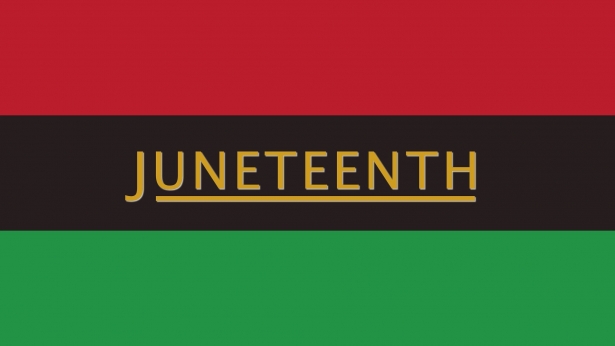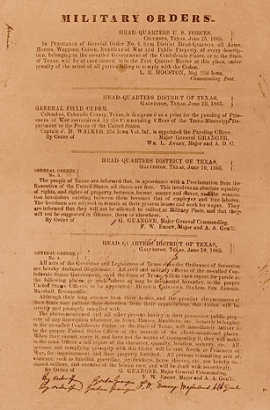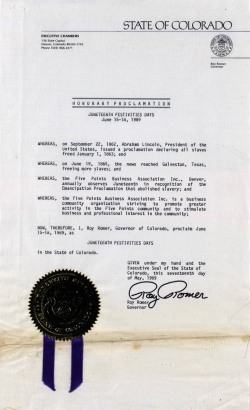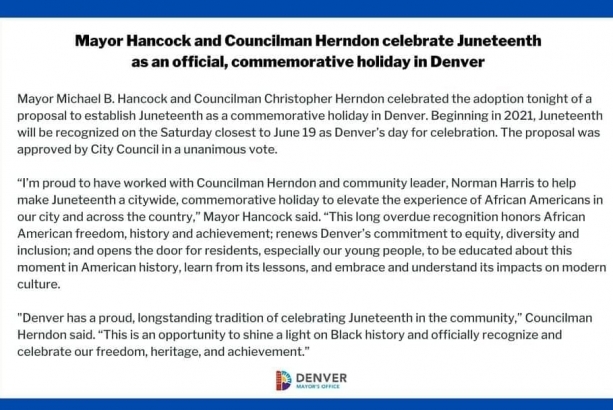The Juneteenth celebration is known by many names; historically as Jubilee Day, Black Independence Day, and Emancipation Day and officially as Juneteenth National Independence Day. The term Juneteenth is a combination of the words June and nineteenth. Exactly how and when this moniker became widespread is unknown. The earliest iteration of the name can be found as early as the 1890s (Zimmer, 2021).
The name is of little importance; the significance lies in what it commemorates. The reason for the celebration may appear simple, but it is more complex than at first glance. The celebration acknowledges and honors the resiliency of formerly enslaved people born from the mental and physical violence and trauma of slavery. The very first Juneteenth celebrations represented the possibility of reuniting with loved ones, the magnitude of choice and personal autonomy, and most of all the freedom to heal, live, and love fully and completely.
Juneteenth is NOT just another summer festival...but a way to celebrate a historical transition that started the process (the 13th amendment abolished slavery in the United States on December 6, 1865) of declaring a final and resolute bon voyage to chattel slavery in America.
History
According to the National Registry of Juneteenth Organizations & Supporters website, “Juneteenth is the oldest known celebration commemorating the ending of slavery in the United States.” President Abraham Lincoln’s Emancipation Proclamation, which had become official January 1, 1863, had little effect on the lives of enslaved people held in bondage in Texas due to white slaveholder resistance and the small force of Union troops expected to enforce the Executive Order.
The order held no authority and slavery continued for the next two and a half years despite its official ending in other parts of the United States. It wasn’t until June 19th, 1865, when General Gordon Granger led Union soldiers to Galveston, Texas, with news that the Civil War had ended and enslaved people were free, that the proclamation finally made an impact. General Order Number 3 informed all Texans that all slaves were free:
The people of Texas are informed that, in accordance with a proclamation from the Executive of the United States, all slaves are free. This involves an absolute equality of personal rights and rights of property between former masters and slaves, and the connection heretofore existing between them becomes that between employer and hired labor. The freedmen are advised to remain quietly at their present homes and work for wages. They are informed that they will not be allowed to collect at military posts and that they will not be supported in idleness either there or elsewhere.
The combination of General Granger’s soldiers and the surrender of General Lee in April 1865 finally overcame slaveholder obstruction in Texas.
Today Juneteenth commemorates African American freedom and emphasizes education and achievement. It is a day, a week, and in some areas a month marked by celebrations, guest speakers, picnics and family gatherings.
A National Celebration to a Federal Holiday
Over the last 156 years, Juneteenth has grown to national recognition across the nation with at least 47 states commemorating the day in some form. The year 2021 has proved to be the year of abundance for Juneteenth at both local and national levels. In Colorado, the Denver City Council declared on February 22, 2021, that Juneteenth would be an official commemorative holiday in the city, elevating the celebration of the end of slavery in the U.S. from the status of a ceremonial holiday.
President Joe Biden made a powerful impact by ushering in history on June 17, 2021 when he signed into law the bill to make Juneteenth a federally recognized holiday. He said, “all Americans can feel the power of this day, and learn from our history” (Karni, 2021). He also commented that Juneteenth was the first national holiday established since Martin Luther King’s Birthday (January 15, observed on the third Monday of January each year) in 1983 (Karni, 2021).
Juneteenth: Five Points and Beyond
In Denver, the Juneteenth celebration began in the early 1950s and eventually grew to be one of the nation’s largest celebrations of its kind. In the 1980s, it began to be hosted in the historic neighborhood of Five Points and largely organized by the Five Points Business Association. As economic and social challenges began to plague Denver in the early 1990s, Juneteenth’s image was negatively impacted due to violence during the festival. As a result, attendance and interest in the festival drastically declined.
In 2012, the Juneteenth Music Festival was formed by a group of entrepreneurs (JMF Corporation) who recognized the opportunity to reinvent the image of Juneteenth and rebranded the celebration to the city of Denver. Under new leadership, Juneteenth is committed to “engaging the community with the historical significance of Juneteenth, while creating a framework for economic and educational empowerment in youth and adults. The Juneteenth Music Festival facilitates events which support redevelopment and elimination of financial blight in Denver, Colorado’s Historic Five Points Neighborhood.” Through the efforts of local community resource organizations, city agencies, corporate and individual sponsors, and donors the festival has evolved and taken on new life and vibrancy.
Today Juneteenth events can be found across the state in the cities of Aurora, Boulder, Colorado Springs, Breckenridge, Denver Metro Area, Erie, Grand Junction, Loveland, and Westminster. It's a festival that is now firmly planted in African American and American history and culture.
Resources
- Denver's Annual Juneteenth Music Festival
- National Museum of African American History and Culture
- Five Points Business Association Juneteenth Archive Collections
- Find resources about Juneteenth at the Denver Public Library
Sources
Karni, A. & Broadwater, L. (2021, June 17). Biden Signs Law Making Juneteenth a Federal Holiday. New York Times. https://www.nytimes.com/2021/06/17/us/politics/juneteenth-holiday-biden.html
Zimmer, Ben, (2021, June 17). How the ‘Juneteenth’ Name—and Holiday—Spread. Wall Street Journal. https://www.wsj.com/articles/how-the-juneteenth-nameand-holidayspread-11623952376






Comments
Outstanding article!!
Outstanding article!!
Thank you for reading!
Thank you for reading!
What a well done synopsis of
What a well done synopsis of such an impactful event. Absolutely OUTSTANDING!
Thank you for reading!
Thank you for reading!
Add new comment